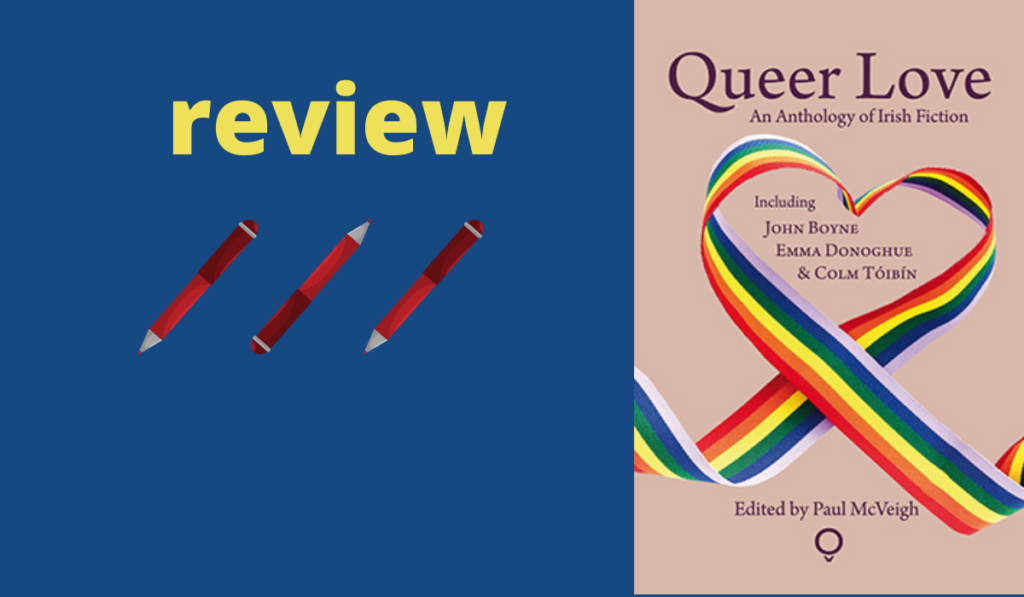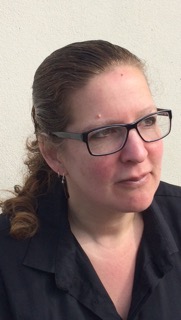
Queer Love: An Anthology of Irish Fiction
edited by Paul McVeigh
(Southword Editions)
by C L Murphy
Ireland is more than one voice and in Queer Love, edited by Paul McVeigh, we see more than one Ireland. Love is a beautiful thing—especially in the hands of familiar writers like John Boyne, Emma Donoghue and Colm Tóbín—but in this anthology of short stories are new writers and new voices; it’s this combination which lends the collection its charm.
The ten stories in this volume are set in different places and times but there is a constant line between the writers, a solidity to their roots. Paul McVeigh steers the collection through our history, from a time of secrecy to the new freedoms of growing up gay in an era of the Yes vote. A quiet line shouts from from Tóbín’s story:
“You think I am strong because I am older, and maybe that is the way things should be.”
The established authors here certainly know how to spin a story but I loved reading the new voices, too. It is essential that we leave a footprint of what it is to be truly ourselves; this publication recognises that need, that space on the bookshelf.
The anthology moves us deftly from one headspace to the next. John Boyne writes about a childhood crush that feels real and relatable. Mary Darcey writes about two young girls whose bodies are waking from childhood, as they spin stories between one another and finally share their first kiss. As can be expected with Colm Tóbín, in Sleep he gives us layers of character and emotion as he peels away the truths between New York and Dublin, between now and then. In Thumbnails, Shannon Yee writes about the experiences of an interracial queer family, about parenting through loss and joy, about the moments that pierce through memories like little shining lights.
Love can be beauty and excitement, but also loss and grief, which the selection of stories in this anthology reflects. Our shared LGBTQ+ history isn’t easy but it is real and in order to celebrate the bright future we work toward, we can’t look away from where we’ve come. Equally, to quote one of my clear favourites, Visual Snow by Declan Toohey:
“Sexuality does not determine my being, my sense of self, my place in the world, or anything else. It’s just there.”
Toohey writes about a relationship between a student and a tutor. The characters leap from the page. A skilled writer, Toohey easily twists humour through some very uncomfortable images in such a recognisable way—laugh at ourselves first, then they can’t laugh at us?—and although the piece is brief, it packs a punch.
Emma Donoghue is one of my favourite writers, and I really enjoyed her short story Speaking in Tongues (great title, fnar fnar). Lee is seventeen, brave and sweet. Sylvia is thirty-four, smart and incredibly sexy—the kind of woman I fell in love with over and over again in my teen years. The story of their night together is fiery and hot, tender and sweet. I loved the comparison of the innocence and the simplicity of the women wanting one another; the heat and clumsy passion of their love making in the back of the van; the setting on the west Galway coast with its cows and thin roads and lack of signposts; the running feel of the lack of signposts inside the van as the two women find one another.
You Roll by James Hudson is a burst of youth and a fierce, fresh voice. He writes about drag and about the new experiences of a young man in the scene, the duality of character. His references are of a newer world but his insight is deep. I reread this story the most and I’ll be looking out for Hudson’s name in the future. As with all the writers published in this anthology, he has that rare skill of writing a short story that somehow encapsulates a longer work. Hudson has this skill in spades.
The collection is mostly limited to gay and lesbian writers but McVeigh can only work with what he has to hand. Perhaps he didn’t have as many queer writers who don’t identify as lesbian or gay respond to the open submission call? In the foreword he says
If you don’t see the book you want to read, then write it yourself.
The answer here is clear—we need more volumes like this on our bookshelves. Queer writers have always been a strong part of the Irish literary community. What better place to start, than a place of love?
Catherine Murphy @scribblingink1












